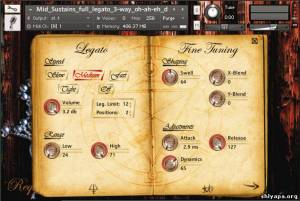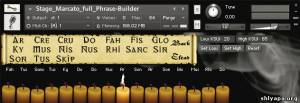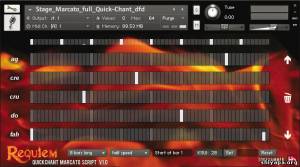Over the last year or so, West Coast company Tonehammer have been steadily making their mark on the sample library market with an idiosyncratic and creative combination of exotic percussion, thunderous drums, moody pianos, evocative female solo vocal collections and er, sampled bees.
Their latest release is by far their most ambitious, featuring the combined talents of 37 singers and a world-famous choir conductor. Recorded over a period of two weeks in the hallowed acoustic of one of San Francisco’s oldest cathedrals, the choir was conducted by Robert Geary, artistic director of the acclaimed Volti choir (who specialise in contemporary music by US composers) and the 200-voice San Francisco Choral Society. SFCS’s Alan Kleinschmidt was also on hand to direct proceedings.
Portentously titled Requiem, the library includes a full choir of sopranos, altos, tenors and basses, separate male and female groups, and five soloists (two sopranos, tenor, baritone and bass), all recorded 24-bit from multiple microphone positions. It ships in two versions: Requiem Pro (which requires the full version of Kontakt 4) is the master library featuring all the mic positions. Optimised for use on laptops and smaller systems, Requiem Light has a reduced sample and articulation menu, includes free Kontakt Player software and blends the different mic position samples into a single stereo mix. Upgrades in both directions are available — the Light brigade can turn Pro by shelling out more dosh, and Pro users can purchase the Light stereo samples as an add-on.
Tonehammer have a download-only policy. Though I applaud this conservation-minded approach, there are potential pitfalls: you’ll need a fast broadband connection to download Requiem Pro’s 23GB of samples, and once they’re copied onto your drive you obviously can’t send them back. Caveat emptor applies here, so to avoid any misconceptions over what you’re buying, be sure to listen to the demos of Requiem at Tonehammer’s site beforehand.
Anyone minded to make pirate copies of the library might want to think again, as the makers have individually watermarked each sample and can thus trace unauthorised copies back to the original owner. (Cue police car siren.) However, Tonehammer are happy for you to freely duplicate the library on your own system without a dongle — they just don’t want you to give away the fruits of their labour to others. It’s hard to argue with that.
Cathedral Tones

Click on the hymn book and an elaborate performance control panel (embossed on alchemist’s parchment, naturally) magically opens. What sorcery is this?
The choir was recorded from three main mic positions, stage, mid and far, with microphones placed respectively five, 15 and 45 feet from the singers. The soloists were also close-miked, giving the option of a drier, mono-ish sound. Certain performances segregate the male and female singers, but rather than sampling sopranos, altos, tenors and basses separately, the choir is mainly presented as a full unit, with the different voices mapped and blended according to range. This has been done so skillfully and naturally that I never noticed the transitions, even when moving between the high male register and the female altos’ range.
As well as providing the basic ‘aah’, ‘ooh’ and ‘eeh’ sustained vowel sounds traditionally found in choir libraries, Requiem adds around 10 subtle variations extracted from longer performances sung by separate male and female groups, and also throws in ‘eh’, ‘ih’, and ‘um’ options (the latter sung by the men only). The sustained multi-vowel presets are recorded at tone intervals, looped, one-dynamic and perfectly in tune; the men’s deliveries have a triumphant ring while the women make a more intimate sound, but both retain a full-bodied, warm and engaging timbre throughout. I noticed that the precise, wide-stereo detail of the stage miking becomes less evident in the ‘mid’ position and disappears altogether in the far miking, which nevertheless has a nice stereo image and a lovely ambient halo. Pan these ‘far’ samples to the rear speakers of your surround mix while positioning the stage miking at the front and your listeners will be effectively seated in a San Francisco cathedral — better warn them not to swear.
Each multi-vowel preset has two layers, which can be crossfaded with an expression (CC11) pedal or controller. Crossfading quickly back and forth between ‘ah’ and ooh’ creates a diphthong effect that the brain translates as ‘oowah-wah-wah’. The San Franciscan choir members might not be best pleased to learn that their vocal efforts can be transformed into a virtual wah-wah pedal in this way, but your reviewer found it to be a lot of fun. Experiments with other vowel combinations threw up some interesting possibilities; in tandem with the ability to instantly keyswitch both layers’ vowels, this adds a realistic and expressive mobility to what would otherwise be tonally static samples.
Tonehammer gently warn that while a historic stone building with acres of stained glass and huge wooden pews creates a stunning visual and sonic environment, the temperature changes caused by the hot Californian midday sun occasionally caused the pews to creak. I heard nothing troublesome while auditioning the samples, but if you detect the odd extraneous noise you can console yourself that it’s a natural acoustic phenomenon occurring in a sacred place, rather than a digital spike caused by some malfunctioning piece of kit.
Alphabet Soup

Requiem’s Phrase Builder syllable-sequencer, complete with moving candle flame graphics. (Monks not provided.)
Those interested in choral ‘word building’ will be pleased to hear that Requiem gives you the means to create virtual phrases. The easiest way to do it is simply to play the classical Latin words; these were sung by the choir at a choice of fast and slow speeds, and presets with ‘time-stretch’ in their name use the pitch wheel to control speed. The ancient language took me back to my school days — as I heard the familiar chants of ‘Adoramus’, ‘Crucifixus’, ‘Dominum’, ‘Lumine’ and the rest, I could feel myself slipping into the near-coma brought on by interminable Latin lessons on wet Thursday afternoons. O Taedium, Miserere Mei... Fortunately, the phrases are sung with sufficient intensity (particularly by tenor Michael Mendelsohn, who hisses his esses and rolls his ‘r’s with great pantomime-villain gusto) to keep us awake, and mercifully I’m no longer required to translate them. In an understandable outbreak of self-big-upping, the makers also asked the choir to improvise renditions of the non-Latin word ‘Tonehammer’, which produced some fairly alarming results.
The library lets you create your own words via 19 different Latin-esque consonant-vowel combinations, sung in staccato and longer marcato styles: Ag, Cre, Cru, Do, Fah, Fis, Glo, Ky, La, Mus, Nis, Nus, Rhi, Rru, Sanc, Sart, Sin, Son and Tus. I eagerly set about arranging these into insulting phrases aimed at our hapless coalition government, but managed only ‘Fahtus Sartus’; although that had a satisfyingly scatological ring, it failed to accurately convey the full extent of my fury. These full-choir syllables are sung at maximum volume (I should think so too — if you’re going to sing ‘ag’, you might as well bellow it at the top of your voice). Regardless of their syllabic content, it’s good to have such blasting, energetic performances in your arsenal.
To help join up these disparate sounds, Tonehammer supply a couple of easy-to-use, fun tools: the Quick Chant Builder functions like a classic TR808-style step sequencer: set the sequence length in bars, specify a tempo in Kontakt and (if necessary) a tempo multiplier, then click on a grid to select the timing and velocity of whichever syllables you wish to trigger. The Phrase Builder does a similar job, and its hilarious graphic of a flame moving across a row of unlit candles is worth the entry price alone. Rather than playing back a sequence of syllables when you hold down a key, the Phrase Builder advances to the next one each time you play a new note. A maximum of 16 syllables can be used, and you can insert blanks if you wish. I tried to perform a version of the spine-chilling legend emblazoned on the walls of Gaudi’s Sagrada Familia: ‘Sanctus, Sanctus, Sanctus’ — it didn’t sound quite right because the ‘c’ of ‘Sanc’ is enunciated too softly, but ‘Agnus Agnus Agnus’ (‘sheep sheep sheep’) sounded spot-on.
If you’re feeling adventurous, you can create quasi-syllables by linking a vowel sound to one of the 54 simple and compound consonant sounds included in Requiem. I used to be sceptical about constructing ‘words’ with samples, but must admit that things have now moved on to the point where it sounds pretty realistic. Tonehammer’s efforts in the field are to be applauded, and I’m sure composers will appreciate being able to add lyrics to their melody lines, even if they are complete nonsense!
Smooth Ride

The ‘Quick Chant Builder’ in Requiem works like a classic step sequencer, allowing you to control the tempo, rhythmic placement and volume of syllables in word-building sequences.
To achieve the all-important ‘joined-up’ effect of real-life legato performance, the producers implemented script-based interval detection, which calculates played intervals in real time and inserts a tiny transitional ‘interval sample’ between notes. The legato samples are long sustains based on the vowels oh, ah, and eh, sung at two dynamics; they default to monophonic, but can instantly be rendered polyphonic (and non-legato) for chordal passages by the use of the ‘legato off’ button.
The transition samples’ response is governed by an on-screen speed setting: the ‘slow’ setting produces gentle, smooth transitions, while ‘slow’, ‘mid’, ‘fast’ and ‘tight’ incrementally shorten the transitions, making the samples more suitable for faster playing. I found the system worked very well for slow and mid-tempo passages, but couldn’t cope with very fast lines or trills. (Tonehammer admit as much in their documentation.) A trill sung by 37 vocalists would sound pretty weird anyway, so I was happy to accept the limitation and wallow in the sound of the voices performing beautifully smooth, stately legato lines.
Supplementing the multisamples, words and syllables is a large menu of excellent vocal effects. Dissonance is a strong point, with the mens’ exaggeratedly nasal cluster chord delivery taking first prize in the ‘Sounds You Will Never Hear On The X Factor’ competition. Claps, finger snaps, foot stamps, shouts, whispers and breath effects are included, along with some rarely-found ‘teeth chattering’ performances that samplists have been seeking for years. The effects range from funny to frightening, and are of sufficient quantity and quality to satisfy the most ardent experimentalist.
For those who enjoy delving deep under the bonnet, Tonehammer’s tech team has provided a host of facilities too numerous to list here. Not everyone will have the time and commitment to explore them, but those who do will find their patience rewarded by some helpful and subtle performance-shaping tools. To get an idea of the library’s deep programming capabilities.
Mindful of the heavy RAM usage of some of their presets (the three-way ‘ah/oh/eh’ legato instruments are particularly demanding), Tonehammer created DFD (direct from disk) versions of them all to reduce the strain. These presets rely heavily on disk streaming and therefore may require higher soundcard audio latency settings to avoid drop-outs. This is a common trade-off with such libraries, and may be the best way to go if you need to build complex choral arrangements on a smaller system.
Conclusion
We may live in irreligious times, but there’s still something transfixing about hearing massed voices intoning ancient Latin phrases. Requiem’s samples are highly effective at producing an instant aura of sanctity, and also pack enough power to cut through a full orchestral arrangement. Adaptable, subtle, expressive, often beautiful and occasionally forceful, these are choir samples of the first order, and the multisamples and effects are a highly desirable addition to a MIDI composer’s resources. If the price of the Pro version seems steep, you can save yourself a considerable amount of money and still retain the essence of the library by buying the Light version; either way, when you consider the amount of work and expertise it takes to create a collection of this stature, Tonehammer’s pricing seems very reasonable.
Requiem Articulations
Multi-vowel sustains (m, w).
Legato sustains (fc).
Classical Latin words (fc, m, w, s).
Marcato syllables (fc).
Staccato syllables (fc, w).
English words (fc).
Numbers (m).
Consonants (fc).
Slow swell woo — aah (fc).
Slow trill (fc, m, w).
Dissonant sweeps (up/down/fast) (fc, m, w).
Clusters (long/shrill) (m).
Improvised ‘tone ambiences’ (fc).
Body noises (fc).
(fc = full choir; m = men only; w = women only; s = soloists.)
System Requirements & Installation
Requiem is formatted for Native Instruments’ Kontakt 4 sampler, which runs stand-alone and as a plug-in on Macs and Windows PCs. The Pro version runs on the full version of Kontakt 4.1.1 or later, and will not work with Kontakt 3.5 or lower, and the Kontakt Player supplied with Requiem Light will not play the Pro instruments. Requiem Pro requires 22.3GB of disk space, while the Light version needs only 3.2GB. Tonehammer don’t publish minimum specs, but as with any library utilising large numbers of samples and multiple mic positions, a fast computer with plenty of RAM is advisable — I’d recommend a minimum of 4GB. If your system has less, you can still use the library effectively by sticking to one mic position, using the optional DFD versions of instruments and utilising Kontakt’s ‘purge’ function to remove unused samples from your arrangements

